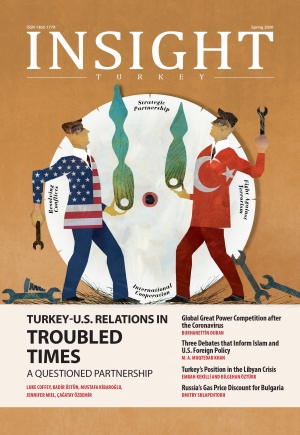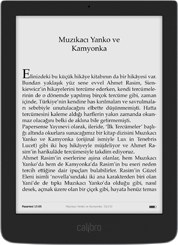Turkey and the United States have been going through dramatic changes after the collapse of the Soviet Union and the end of the Cold War. Both countries began to search for new political identities in the international system. With the end of ideological competition, the U.S. remained unchallenged for a while, and this has created an identity crisis for the U.S. With the beginning of the 21st century, especially with the September 11 attacks, the U.S. declared international terrorism as the new other of the Western world. Similarly, Turkey has adjusted its foreign policy orientation according to the post-Cold War realities. After the loosening of the Western alliance and the decline of U.S. superiority in the international system, Turkey began to follow a more assertive foreign policy in order to increase its role and autonomy in international politics.
While the relative power of the U.S. has been declining, Turkey’s economic and political power has been rising. On the one hand, the U.S. does not perform the role of the global hegemon anymore. The U.S. government refuses to provide global public goods such as international security and free trade. As can be observed in its recognition of ‘united Jerusalem’ as the capital of Israel, the Israeli occupation of the West Bank and the annexation of the Golan Heights, the U.S. even does not abide by the principles of international law.
On the other hand, Turkey has been trying to improve its relations with different global and regional powers. In addition to its traditional Western allies, Turkey began to engage with other regions and continents including East Asia, Africa, and Latin America. Turkey has been attempting to restructure its foreign policy into a more diversified and independent one. The more Turkey follows an independent foreign policy, the more it has been otherized by the Western countries, the U.S. in particular.
Eventually, the longtime Turkish-American partnership began to be questioned. Bilateral relations of the two formal allies have been going through troubled times. The Turkish-U.S. alliance or strategic partnership has been questioned by different issues such as the purchase of S-400 missiles, the American financial and military support for YPG/PKK, the protection of FETÖ ringleader in Pennsylvania, and the U.S. cooperation with the anti-Turkey bloc in the Middle East. Pro-Israeli lobbies in Washington D.C. have abandoned their traditional pro-Turkey stance especially when Turkey and Israel began to confront in the Middle East. Furthermore, the United Arab Emirates and Saudi Arabia have bought most of the American lobbies to mobilize the Congress and the White House against Turkey. Finally, these lobbies have openly mobilized support from the American authorities to support FETÖ and PKK/PYD/YPG against Turkey, which has led to the increase of anti-American feelings in Turkey.
Nowadays, there are significant differences in Turkish and American foreign policies, with their perspectives of the Middle East and the global system being quite different, in some cases opposing. At the regional level, while the U.S. supports the authoritarian regimes of the region, Turkey has been supporting the mainstream popular movements. As in the Syrian and Libyan crises, the U.S. does not support Turkey even in its confrontation with the Russian Federation, the main ‘other’ of the NATO alliance. At the global level, the U.S. is not happy with the system that has been established in the wake of the Second World War, yet it is not offering any alternative. However, Turkey asks for the transformation and reformation of the global system to make it more inclusive and representative.
All these differences have led to simmering tensions and mutual mistrust and created an atmosphere to question the entire bilateral relationship and the seventy-year long alliance. The two countries are unable to align their counter-terrorism strategies due to the U.S. instrumentalization of one terrorist group in its struggle against another. It becomes more and more difficult for a confused U.S., which has been following a unilateral global policy, and a Turkey, which has been trying to change its position in the international hierarchy, to coordinate their relations.
As both countries are going through hard times and transitory periods, it will take time for them to adjust themselves to new global realities. Ultimately, they will have to redefine their foreign policies according to their strategic priorities. Considering that it is not the rise of Turkey, but that of China and Russia which threatens the American global hegemony, the U.S. will eventually have to rethink its stern anti-Turkish stance in the Middle East.
This issue of Insight Turkey brings to its readers six papers touching upon this ever-changing Turkey-U.S. relationship. Three commentaries and three articles focusing on Turkey-U.S. relations are worth reading to better understand the main issues, challenges, as well as opportunities under the light of recent conjunctures. These pieces concentrate on differing perspectives of the two countries, especially in the last decade, and the interdependence between them.
Luke Coffey presents a new perspective about Turkey-U.S. relations, which after decades of cooperation, is at an all-time low. Emphasizing the importance of hard work, persistence, and comprehension of the various policy disputes, he encourages policymakers to “start small and think big to rebuild this relationship,” which once was a cornerstone of the success of NATO. Coffey maintains that the two countries will continue to matter for one another for a foreseeble future.
Kadir Üstun provides a comprehensive analysis on how Turkey-U.S. relations have been able to survive despite years of strategic feuds and diverging interests. He asserts that both actors seem to have learned how to compartmentalize most bilateral and international issues and tensions. Üstun also points out that as Turkey and the U.S. have disengaged from “inorganic” channels in their bilateral relations, they now have a healthier, even if more conflictual, relationship. However, U.S. policies in the Syrian crisis, such as supporting the PKK/PYD/YPG, have damaged the mutual bonds.
Jennifer Miel’s commentary provides a timely analysis for Turkey-U.S. relations, which once were led by defense and security ties but have become a keystone of economic affairs. Miel examines the economic and commercial opportunities in key sectors for the United States and Turkey during and after the COVID-19 pandemic. She argues that both states can benefit mutually from a more robust collaboration in relatively less notable sectors such as healthcare, the digital economy, and finance.
In addition to these three commentaries, this issue includes three research articles focusing on Turkish-U.S. relations, as well as their foreign policies, under the COVID-19 pandemic. Burhanettin Duran sheds light on the on-going great power competition and argues that the pandemic will not establish a new international system, but will certainly affect it by creating a global instability where states will invest in self-sufficiency and redefine their strategic areas. As the main topics that will define the future of the international system, Duran draws particular attention to the decline of U.S. hegemony, the challenging policies of China, the U.S.-China relations, and the EU’s deepening crisis.
In his article, Mustafa Kibaroğlu focuses on the prospects of Turkish-U.S. relations in the post-COVID international order. He specifically discusses if this pandemic would grant a favorable environment for Turkey and the United States to reset their relations in order to accommodate themselves better to the new realities in international politics.
Çağatay Özdemir’s article focuses on Turkey’s position and reactions within the framework of the international competition over natural gas and oil in the Eastern Mediterranean. In the middle of the balance-of-power politics in the region, Turkey is being isolated through unilateral actions and guided alliances. Describing the situation as a U.S.-backed containment of Turkey, Özdemir examines the formation of the anti-Turkish bloc and discusses its possible repercussions in Turkish foreign policy.
Besides the pieces covering Turkey-U.S. relations, this issue also includes a number of commentaries and articles covering different issues relating to Turkey, the Middle East, and international politics. In their analysis on Turkey’s current position and policy in Libya, Emrah Kekilli and Bilgehan Öztürk present the grounds for and nature of Turkey’s increasing cooperation with Libya’s Government of National Accord (GNA). They also claim that Turkey’s support to the GNA has changed the dynamics in the conflict in Libya.
The commentary by Dmitry Shlapentokh examines Russia’s gas price discount for Bulgaria. The author links the discount to frequently unfavorable circumstances for Gazprom’s operations in Europe in general, and in Bulgaria in particular. This commentary highlights that with the emerging alternatives to Russian gas, Bulgaria was able to negotiate with Russia for a more favorable price in obtaining natural gas.
In his article, M. A. Muqtedar Khan argues that a post-orientalist discussion has arisen over the past few decades to challenge the dominance of orientalism on Western foreign policy thinking towards Islam and the Muslim Discussing the geostrategic views of Bernard Lewis, Edward Said, and John Esposito, Khan concludes that while post-orientalism has triumphed in the academic literature, the orientalist perspective still dominates the policy sphere and continues to shape American foreign policy.
Using a rich theoretical literature on leadership and political empowerment, the article by Kasım Timur and Rasim Özgür Dönmez offers an analysis of the mutually empowering relations between Turkish President Recep Tayyip Erdoğan and his followers. In order to illustrate how leaders and followers influence each other in times of political crisis, as a case study, the article examines how Erdoğan’s charismatic leadership galvanized his followers during the July 15 coup attempt in Turkey, and how his followers’ support has further empowered Erdoğan as a leader.
In recent years, the use of social media discourse has shifted from having a positive effect on democratization to a tool threatening democracy. In this regard, Turgay Yerlikaya focuses on how virtual social networks affect socio-political life, particularly how networks such as Facebook and Twitter can shape electoral preferences during election times through manipulative content and fake news.
The last article of the issue examines the impact of soap operas as a multi-faceted phenomenon that, as a product of cultural hybridization, can also contribute to cultural hybridization wherever they are broadcasted. In her case study, Ouafaa Rafi examines Turkish soap operas watched in Morocco and discusses the encompassing dynamics at stake when it comes to cultural influence and interaction.
This issue of Insight Turkey aims to present the current situation of the Turkish-American relations and to provide to its readers with a general framework of important events and developments in Turkey and its surrounding regions. We hope that this issue contributes to a better understanding of these crucial issues.




